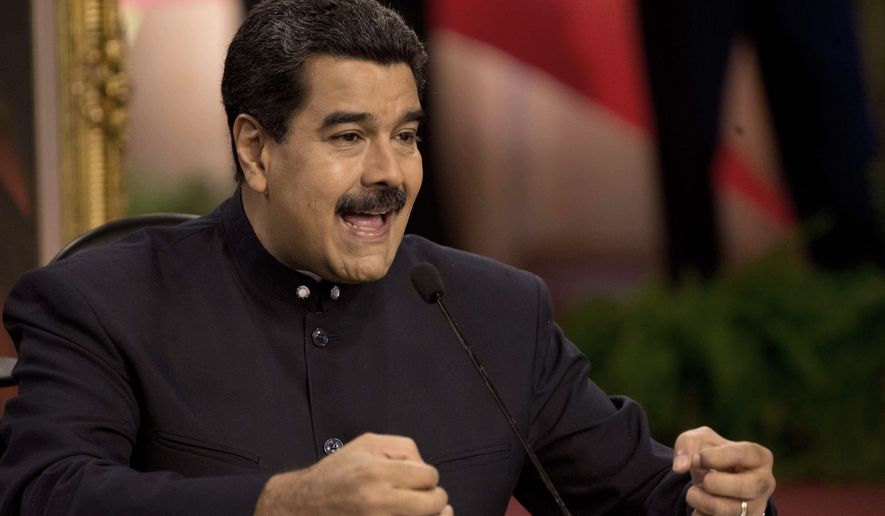President Trump hit Venezuela’s socialist government Monday with sanctions in an attempt to block the regime’s new digital currency, which U.S. officials call a “scam” used to evade previous economic sanctions.
Treasury Secretary Steven T. Mnuchin said the measures seek to force President Nicolas Maduro to change course from the authoritarian rule that critics say has undermined democracy and the rule of law in Venezuela while sparking a deep economic depression.
“President Maduro decimated the Venezuelan economy and spurred a humanitarian crisis,” Mr. Mnuchin said in a statement announcing the sanctions. “Instead of correcting course to avoid further catastrophe, the Maduro regime is attempting to circumvent sanctions through the petro digital currency — a ploy that Venezuela’s democratically elected National Assembly has denounced and Treasury has cautioned U.S. persons to avoid.
“We urge Maduro to distribute humanitarian aid and stop blocking much-needed foreign assistance to the suffering people of Venezuela, and we again call upon the Venezuelan military to respect and uphold the Constitution,” added Mr. Mnuchin.
Oil-rich Venezuela has descended into poverty, hyperinflation and chaos under corruption and economic mismanagement. Mr. Maduro, a protege of the late anti-U.S. populist leader Hugo Chavez, says he is trying to deal with sharp levels of economic inequality that have long plagued the country.
The sanctions have been imposed less than a month before Mr. Trump is scheduled to attend a Summit of the Americas in Lima. The summit’s Peruvian hosts have said Mr. Maduro is not welcome at the hemispheric gathering, but the Venezuelan leader has vowed to attend anyway.
Faced with hyperinflation and the inability to attract significant foreign capital investment, Venezuelan currency officials launched their state-issued version of bitcoin in February in an attempt to reverse the country’s economic slide. Mr. Maduro said each “petro,” as the currency will be called, would be backed by a barrel of oil, issuing about 100 million tokens with an estimated value of $6 billion.
Mr. Maduro said the government raised $735 million in the first day of a pre-sale in February, adding later that Venezuela is preparing a cryptocurrency called “petro gold” that will be backed by precious metals.
Mr. Trump signed an executive order prohibiting U.S. citizens or anyone under U.S. jurisdiction from engaging in transactions with Venezuela’s petro. The prohibition also applied to petro gold or any new cryptocurrency created by Venezuela after Jan. 9.
Mr. Trump began increasing pressure on Venezuela in July by labeling Mr. Maduro a dictator and imposing economic sanctions. Those moves followed widely criticized elections that gave Mr. Maduro sweeping power and undercut the authority of the opposition-controlled national parliament. The chaos and economic shortages in Venezuela have spread instability to other countries in the region. Colombia, a strong U.S. ally, is dealing with a major refugee crisis of Venezuelans fleeing their homeland.
Sen. Marco Rubio, Florida Republican and a leading critic of the governments in Venezuela and Cuba, cheered the sanctions and called for more pressure.
“I commend the president and his administration for continuing to take action against efforts by the illegitimate Maduro regime to exploit illicit financial lifelines, and encourage additional sanctions in the weeks to come,” Mr. Rubio said.
Senior U.S. officials argue that any exchange in the digital currency would be a direct investment in the Maduro regime and would be unlikely to benefit the Venezuelan people.
“It’s a desperate effort by a corrupt regime to defraud international investors,” said one official, who briefed reporters on the condition of anonymity.
The Trump administration has held off from imposing sanctions on Venezuela’s oil industry. Officials stressed that “all options remain on the table.”
The Treasury Department also announced sanctions on four Venezuelan government officials accused of corruption. The sanctions froze all their assets under U.S. jurisdiction and prohibited U.S. citizens from dealing with them. Those sanctions were not directly linked to the petro issue, said Trump administration officials.
The Venezuelan government did not have an immediate comment, but a large group of American leftist groups signed an open letter to denounce U.S. sanctions and to call for diplomatic mediation in the standoff between Washington and Caracas.
“Sanctions merely complicate efforts by the Vatican, Dominican Republic, and other international actors to mediate a resolution to the deep polarization in Venezuela,” the letter said. “Moreover, sanctions undermine efforts of the democratically elected government and Constituent Assembly to address critical economic issues and determine their own political destiny.”
• S.A. Miller can be reached at smiller@washingtontimes.com.




Please read our comment policy before commenting.